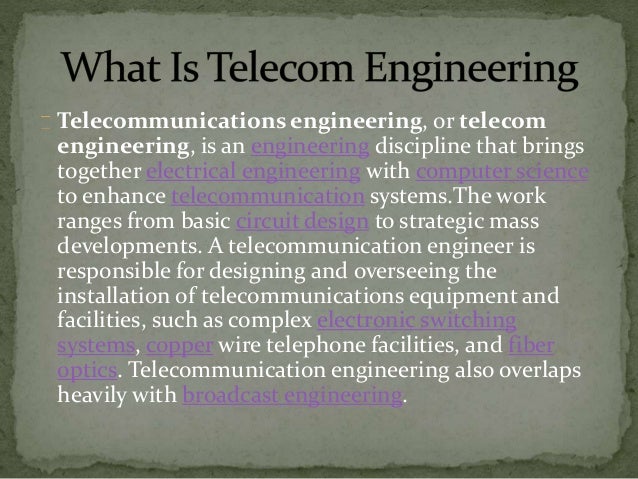Course of the Week- B.Sc. Telecommunication and Information Engineering
The Bachelor of Science degree program in Telecommunication and Information Engineering (TIE) is designed to produce a graduate engineer who has knowledge in the core areas of Telecommunication and Information Engineering. To make the course more encompassing the students are trained to become knowledgeable in humanities and other professional courses. Furthermore, to fit into the competitive and very challenging real world, the graduates are also trained on entrepreneurship, accounting, management and project management.
The degree program is designed to meet the demand for building capacity for qualified manpower and to facilitate research, design, development and production of new ideas and new products in this field. This will provide access to many of the new technologies of mobile, radio, rural and remote communication facilities for voice, data, facsimile, email, internet and video/data.
http://www.jkuat.ac.ke/departments/tie/bsc-telecommunications-and-information-engineering/

The degree program is offered by the School of Electrical, Electronics and Information Engineering (SEEIE) under the College of Engineering and Technology (COETEC).
Course Duration
The duration of study extends over a period of five (5) years, each academic year consist of two (2) semesters.
A candidate in first, second, third, fourth and fifth year of study shall take a minimum of 16 units.
Minimum Entry Requirements
A student wishing to pursue this program must meet the below minimum requirements:
Government sponsored (GoK)
- Cluster subjects of Maths, Physics, Chemistry, Biology or any GROUP III or any GROUP IV or any GROUP V
http://student.kuccps.net/programmes/degree/1232/
Self-Sponsored students (SSP)
- Kenya Certificate of Secondary Education (KCSE) applicants should satisfy all the requirements below:
- A candidate must have a mean aggregate of at least grade B– (minus)
- The mean grade for the total score in the four cluster subjects must be at least B (plain)
- In the individual cluster subjects, a candidate must have at least the scores given below:
Alternative A
- Mathematics B (plain)
- Chemistry C+ (plus)
- Geography/Biology C+ (plus)
- Any Group IV subjects
Alternative B
- Mathematics C+ (plus)
- Biological Sciences C+ (plus)
- Geography C+ (plus)
- Any group IV subjects
- Kenya Advanced Certificate of Education (KACE) or the A-level equivalent should satisfy all the requirements below:
- At least two principal passes in Mathematics and Physics; and
- At least a total score of nine(9) points at the KACE or equivalent; and
- At least a credit pass in chemistry at the KCE or its equivalent.
- Higher Diploma holders: A candidate holding a Higher Diploma from Kenya National Examination Council shall be admitted into the third year of study.
- Diploma applicants: A candidate must be a holder of JKUAT diploma in engineering with at least a credit pass in the relevant discipline. Diploma holders will normally be admitted into the second year of study.
- A holder of other qualifications recognized by the Senate as equivalent to 1, 2, 3 or 4 above.
Career Paths
Telecommunications engineers work for a variety of employers, including:
- Telecommunications companies
- Equipment manufacturers
- Technical service companies
A variety of careers available for telecommunications systems professionals include:
- Telecommunications Systems Managers– they develop, modify, and monitor the various different telecommunications systems.
- Line Installers– installation of new lines, by constructing utility poles, towers, and underground trenches to carry the wires and cables.
- Customer Service Representative– assist new and existing telecommunications customers with various aspects of their accounts, including repair, installation, billing, and selecting appropriate telecommunications services.
- Computer Software Engineers– develop and build new computer software technology.
- Computer Programmers– writing, applying, and testing various instructions that computers must follow to perform appropriately.




